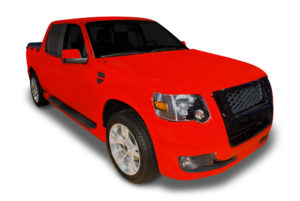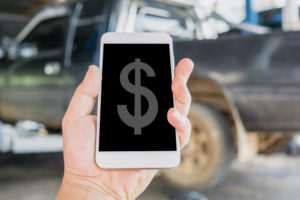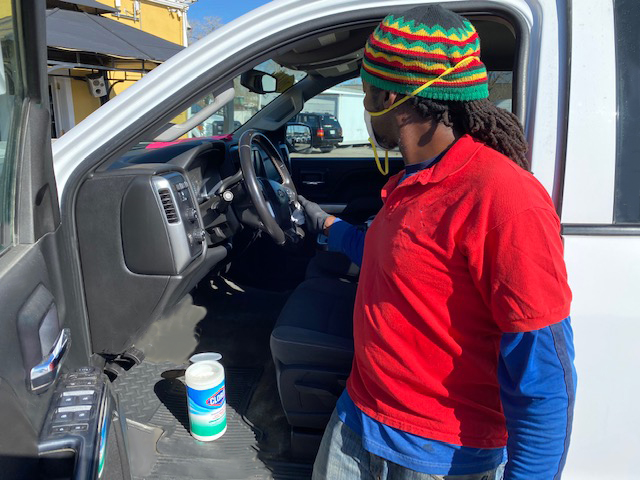Dye Autos Denver Area Truck and Automotive Blog
5 Things to Know Before You Buy a Pickup Truck This Spring
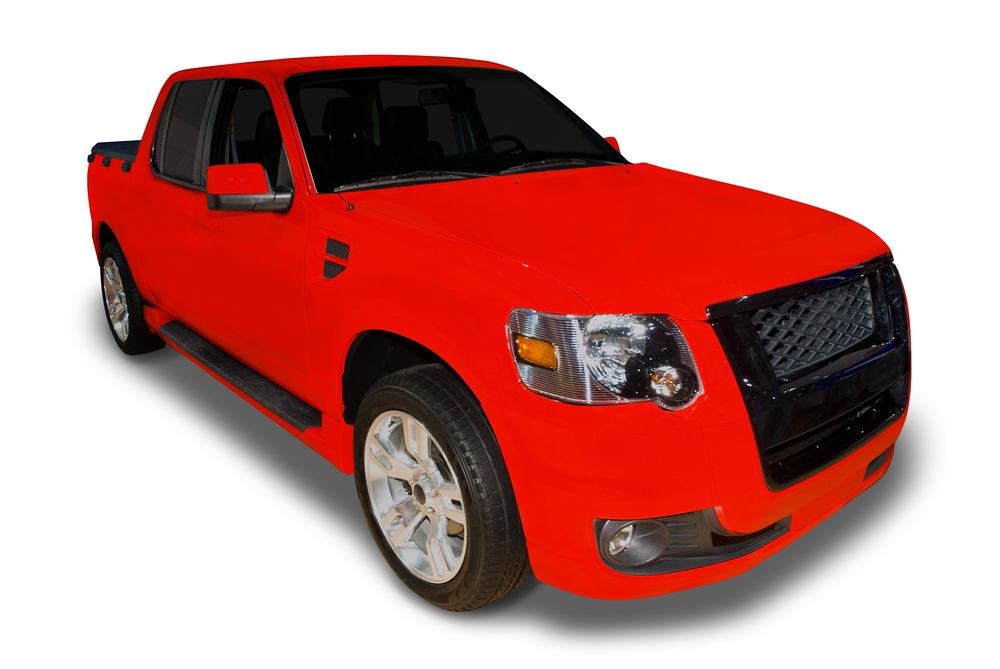
It’s Springtime and as the weather gets warmer, many consumers decide it’s time to buy a pickup truck. You may be considering how a new pickup truck will look in your garage too so let’s talk about the things you need to know before you buy.
At first glance, shopping for a pickup truck might seem a lot like shopping for a car. Pick a color, engine, trim and you’re set, right? But once you consider all the special uses for pickup trucks and the growing number of styles and options, you can quickly get lost in a maze of choices.
Here, then, is how to make truck shopping easier. If you understand the big picture and narrow your options logically, you can more easily find the right truck for you.
1. Know What You Plan on Carrying or Hauling
How you plan to use the truck will guide you to your final choice. Your answers will narrow the field by helping you choose between two- and four-wheel drive. For example, if you are towing a boat or Jet Ski, you might need four-wheel drive to gain traction on slippery boat ramps. If you’re a couple who want to pull a very large mobile home, you might need a “dually” (two rear wheels per side) for towing stability.
2. Choose from Light-Duty, Medium-Duty or Heavy-Duty
Once you know what you’ll tow, find out how much it weighs and be sure to include the weight of the trailer, too. This information will help you choose between a light-duty and heavy-duty truck. Trucks divided into light-duty, medium-duty and heavy-duty categories, identified by numbers such as 1500, 2500 and 3500 or 150, 250 and 350. For example, the Chevrolet Silverado 1500 and the Ford F-150 both have impressive towing capacities, but they are considered light-duty trucks.
Sizing the truck properly is important. If you skimp on power, the truck might have trouble hauling what you need. If you buy more truck than you need, it will cost more at purchase and every time you fill up. Plus, you’ll have a harder time fitting into parking lots or tight driveways.
ProTip: Ask your dealer. Dye Autos has helped many, many customers figure out what the best option is for their unique needs.
3. If you’re planning on trading in your old vehicle, get it ‘trade in ready’.
- Check your trade-in’s value.
- Know where you stand on your loan.
- Clean it up.
- Get your paperwork in order
4. Do the numbers.
When you’re ready to buy a pickup truck, you’ll need to research loan options. There are often attractive programs from your local dealership with better interest rates than you’re able to get at your local bank or credit union.
If you’ve experienced challenges with your credit history, it will bump you out of the top tiers of borrowers. Keep your expectations in check because truck lenders have very specific criteria you must meet.
5. Get Pre-Approved
This fast and easy process lets you choose how much you want to borrow based on the type of truck you’re looking for. Pre-approved truck financing with DYE Autos is just a click away. Visit this link >>>here<<< to get pre-approved.
We’ll put our experience to work for you.
We’re here to make your journey to buy a pickup truck simple and easy. Once you complete the short online application, one of our helpful finance specialists will contact you to discuss available financing options, including the amount you’re qualified to finance.
“If it’s a truck you wanna buy, you’d better call DYE!”
Read MoreHow to Determine How Much You Should Spend on a Used Car
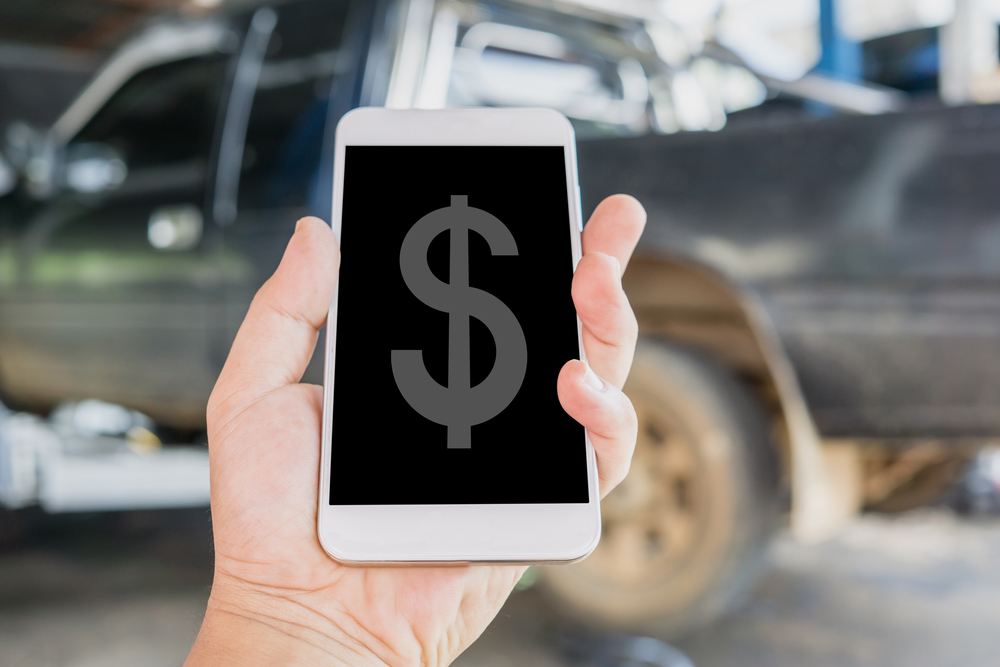
It’s super smart to know your financial health before setting sights on a new car. Many customers we talk to don’t come equipped to determine the best used car for their budget. You can save yourself a lot of money – and a lot of headaches – by doing some simple math before you make your final decision.
If you don’t have a clear picture of how much you can actually afford, it’s easy to bite off more than you can chew. Many people fall in love with a dream car and ignore red flags when it comes to the math.
Even though your (new) used car has monthly payments that seem manageable, it’s always best to know for sure.
How Much Should You Spend on a Used Car?
Buying a used car is one of life’s biggest expenses, and it’s a purchase where you have control over how much you spend.
Financial experts offer wildly different advice on how much you should spend on a car. One school of thought holds that all your automotive expenses (gas, insurance, car payments) should not exceed 20% of your pretax monthly income.
The general rule of thumb is that you shouldn’t spend more than 20% of your monthly income on your car payment.
Knowing your monthly fuel and insurance costs will also help you make an educated decision if you’re considering multiple vehicles. Some may cost more to fuel up; others might have a higher cost to insure.
What you’ll pay
Most buyers with better-than-average credit will pay less-than-average for financing.
Down Payment
A down payment is usually required by lenders, and it’s definitely a good idea. Why?
- It will reduce the amount you’ll need to borrow.
- It improves your chances of loan approval.
- You may get better terms with a down payment.
- It will reduce your monthly payment.
Your credit history will determine the size of the used car loan you can get. If you have less-than-average credit, the high interest rate will make the amount of your loan even lower.
A down payment will offset the interest, taxes, and fees and widen the selection of vehicles you can choose from.
Taxes and Fees
- Calculate your sales tax rate.
- Estimate your License fees.
- Ask your dealer how much their documentation fee is.
Pro Tip: Know your credit score and work on your credit before you start shopping.
Check your credit report as soon as you start thinking about buying a used car or truck, even if it’s months in advance.
If you’ve got less-than-ideal credit, taking this action will help you even more…and save you tons of time and money.
By cleaning up your credit before applying for a loan, you improve your chances of being approved with decent terms. Cleaning up your credit will include paying off past due accounts, disputing credit report errors, and adding positive information to your credit report.
Do your homework before you buy.
By determining how much you should spend on a used car or truck, you’ll be wise to the bigger picture of vehicle expenses BEFORE you head out the door. You’ll end up with a great vehicle that’s best for you, your family AND your wallet.
Call us!
We shared these tips with you because our current customers have told us how grateful they are for this information. We enjoy helping people decide on the right used car or truck.
We can help you too! Call us at (303) 286-1665 or simply fill out our handy contact form >>here<<.
Read More5 Core Traits of a Top Used Car Dealership in Denver

Buying a used car or truck is both a financial commitment and an emotional one. Ideally, your used car dealer should be who you think of first for solid advice. But what happens when you don’t have a dealer you’ve worked with before? What if you’ve worked with a dealer before and had a bad experience? To help you determine the best fit, we’ll share with you the five core traits to look for when shopping for a top used car dealership in Denver.
Choosing where to buy your next car or truck hinges on more than just price. In fact, studies show that when consumers trust their dealer, price becomes secondary.
You’ve probably experienced this yourself. Perhaps you’re partial to a specific brand of workout wear or trainers. You enjoy the products the brand makes and you’re always excited to see what’s new from them. The fact is, you’ve developed a ‘relationship’ with that brand and when something new comes out, you’re eager to buy. Price becomes secondary in your purchase decision.
All too often though, consumers don’t have the information they need to make the right decisions on where to buy their next car or truck. They aren’t able to develop that ‘relationship’ with a brand they trust.
5 Core Traits of a Top Used Car Dealership in Denver
1. Company Culture (attitudes of salespeople)
We all know the car salesperson stereotype. We also know that stereotypes aren’t universally accurate.
Overly aggressive salespeople can sometimes overshadow the rest of us, who sincerely believe that every customer is a customer for life. The attitude of your salesperson is a good indicator of a dealership’s overall culture. A salesperson who respects you works for a dealership that respects you.
2. Responsiveness
It’s easier now more than ever for dealers to miss the cues that customers give to dealerships. We’ve all been subjected to sellers who either respond with redundant information or with no information at all.
You should expect a top used car dealership in Denver to respond quickly and often to your inquiries. If you request an online quote, for example, you deserve a fast response. This is an indication that the dealership values your time as much as you do.
3. Product and Price Assortment
It’s not enough in today’s online “e-commerce” world to offer a great assortment of vehicles on the dealership lot. A top used car dealership in Denver positions and merchandises their inventory well online.
A good product and price assortment of used cars makes for a better shopping experience. It shows that the dealer is eager to work with all types of customers in every financial bracket.
A good selection of cars indicates a top dealership. It represents a well-managed operation and that many other car shoppers have enjoyed doing business with that dealership.
4. Likability
All of us love to buy from people we know, like and trust.
Here’s how we approach this at Dye Autos. We pride ourselves on delivering a memorable customer experience. From your first interaction with us to what we hope will become a long-lasting relationship, we recognize how important it is to keep customers coming back.
We appreciate how tough it is to shop for and buy a used car or truck. There are a lot of moving parts in the decision. Many of our customers say how helpful, honest and attentive we are. We like to think if it like this: We are just like you.
We’re not pretentious, we understand and we can help.
5. Easy Financing
FACT: when you shop for a used car, you’re also shopping for a used car loan.
Financing your next car is a big decision with many moving parts and having a trusted partner to guide you is crucial. Look for a dealership:
- With many years experience dealing with all types of loans.
- That provides you with terms and financing options upfront without any hidden fees.
- That gives you an easy way to get pre-approved
This fast and easy pre-approval process lets you choose how much you want to borrow based on the type of vehicle you’re looking for. Pre-approved truck financing with Dye Autos is just a click away. Visit this link >>>here<<< to get pre-qualified.
We’ll put our experience to work for you. One of our helpful finance specialists will contact you to discuss available financing options, including the amount you’re qualified to finance.
In Summary…
Not all dealerships are created equal. Each one is owned and operated independently so do your homework. We’ve been a top used car dealership in Denver area for many years and we’re happy to help you any way we can.
“If it’s a truck you wanna buy, you’d better call Dye!”
Read MoreLooking for a Bad Credit Car Loan? Don’t Forget These Important Steps
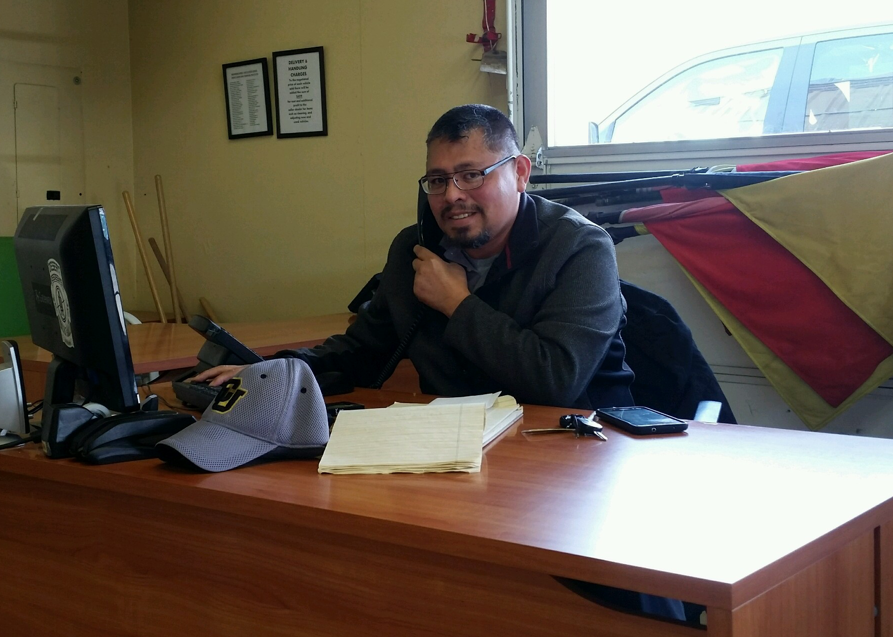 Many of our customers tell us that shopping for a bad credit car loan is just as challenging as shopping for a car. We’ve compiled a list of 9 steps to help you navigate the waters of car and truck loans when your credit is not as good as you’d hoped.
Many of our customers tell us that shopping for a bad credit car loan is just as challenging as shopping for a car. We’ve compiled a list of 9 steps to help you navigate the waters of car and truck loans when your credit is not as good as you’d hoped.
A low credit score is generally defined as a FICO score under 629. You can have a lower score for a variety of reasons, including a history of making late payments, identity theft or simply not having enough years of credit history. Your credit score dictates what type of interest you’ll end up paying on your car loan, and a low score means a higher interest rate.
1. Work on your credit before you start shopping.
Check your credit report as soon as you start thinking about buying a car or truck, even if it’s months or years in advance.
By cleaning up your credit before applying for a loan, you improve your chances of being approved with decent terms. Cleaning up your credit will include paying off past due accounts, disputing credit report errors, and adding positive information to your credit report.
2. Don’t assume the worst.
Never take someone else’s word that your credit is bad. Check for yourself by obtaining your credit report and credit score.
You are entitled to a free credit report from each of the three credit reporting agencies (Equifax, Experian, and TransUnion) once every 12 months. You can request all three reports at once, or space them out throughout the year.
3. Shop around.
When you’ve got bad credit, “you’re likely to agree with just about anything a lender offers you. But you shouldn’t just take the first offer you get,” warns Chris Kukla, senior vice president at the nonprofit Center for Responsible Lending.
Look for ways to save money on a car loan:
- Shorter term
- Factor in all the costs (insurance, gas, parking fees, etc)
- Get 2-3 quotes
- Make additional payments if you can
4. Start close to home.
Even if you don’t think you can get a loan, go to your bank or your credit union first. Apply at the bank where you have a checking account or your credit union. And see if your employer or insurance company offers auto financing.
Lenders who know you may provide better rates and terms.
5. Seek out a trustworthy dealer.
Believe it or not, car dealers have pretty great car loan options. They work with banks every single day and can often match or have better rates than what you’ve found in your search.
Trust is important and many dealers will work hard to keep yours. If you’ve done business with a dealer before or someone has recommended one (even through Yelp or Google reviews), include a call to your dealer in your purchase process.
6. Don’t go it alone.
Ask a friend or relative to go with you. It’s always better to have a separate pair of eyes and ears when making big decisions.
7. Pay attention to loan terms, not monthly payments.
Look for the lowest annual percentage rate (APR) over the shortest period of time. Write everything down.
If the terms are beyond your means, then consider a different vehicle at a lower price.
Focusing on monthly payments could cause you to pay more much more in financing costs.
8. Be aware of “extras.”
The Center for Responsible Lending advises that car buyers should never allow the loan to be contingent on purchasing any add-on, such as extended warranties, after-market services and even insurance.
9. Get Pre-Approved.
This fast and easy process lets you choose how much you want to borrow based on the type of vehicle you’re looking for. You’ll know ahead of time what to expect…and that means less anxiety and more peace of mind.
Let Dye Autos put our experience to work for you. Pre-approved car and truck financing with DYE Autos is just a click away. Visit this link >>>here<<<!.
One of our helpful finance specialists will contact you to discuss available financing options, including the amount you’re qualified to finance.
“If it’s a truck you wanna buy, you’d better call DYE!”
Read MoreShould I Trade-in My Car or Sell Privately? The Pros and Cons
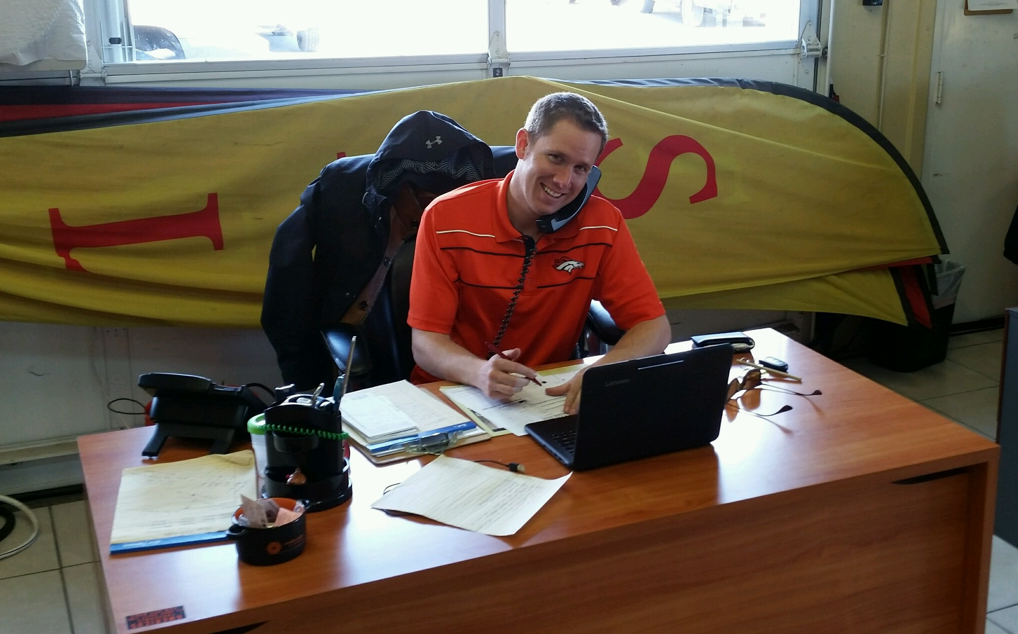 You’ve decided to get a new car (or “new to you” car) and deciding what to do with your old car can be tricky. Nearly every person at sometime in their life has been faced with the challenge of “Should I trade in my car or sell privately?”
You’ve decided to get a new car (or “new to you” car) and deciding what to do with your old car can be tricky. Nearly every person at sometime in their life has been faced with the challenge of “Should I trade in my car or sell privately?”
Many buyers prefer the simplicity of trading in their current vehicle at the dealership even though they may not get as much money for it. Others choose to do the legwork, find an appropriate buyer and try to get a better price. Here are the Pro’s and Con’s to help you make the decision.
Trading In Your Car
The pros of trading in your car.
One of the major advantages to trading in over selling privately is convenience. Dealers will handle all the paperwork and all you’ll have to do is sign your name.
If your car has any minor defects, you won’t have to worry about getting them repaired before trading in. Minor defects such as small dents, scratches or moderately worn tires won’t make a difference in the offer a dealer will give you. Dealers typically handle fixing minor issues before reselling the vehicle.
If you’ve kept your car in good condition, you can also use it as a down payment. Cash can be a very helpful factor in reducing the overall cost of your new car.
If you’re “upside down” in your car loan (you owe more than it’s worth), the dealer can often roll the difference into the new car loan. Word of caution: you’ll be paying a higher payment and lender approval depends on creditworthiness.
The cons of trading in your car.
There’s really only one main disadvantage to trading in your car: you won’t get the price you would if you were selling it to a private party.
Dealers will offer you wholesale price, not its retail value. This means that while you may have determined your car’s market value, expect the dealership to offer you a price that’s less than what you’d get if you sold it privately.
Selling Your Vehicle to a Private Buyer
The pros of selling to a private buyer.
The most basic benefit to selling a car to a private party is the cash.
You are more likely to get close to your ideal asking price when you sell your car yourself. You’ll have more flexibility to negotiate with a private buyer, and you can hold out until you get an offer you’re happy with.
The cash can be used as the down payment on your new car loan, thereby lowering your payment.
- If you have bad credit, the extra cash can help you get a better loan. Lenders like to see larger down payments.
- If you have good credit, and don’t need to lower your new car’s payment, you can spend the cash in some other way. You can probably find a million ways to do that, right?
The cons of selling to a private buyer.
The biggest disadvantages of selling your car vs. trading it in are time and paperwork.
When selling your car yourself, you’re at the mercy of the buying market, and you’ll need to wait as long as it takes for buyers to come calling. While there are plenty of ways to promote your vehicle for sale, you’ll need patience to find the right offer.
Selling privately means all the paperwork duties for the sale fall on you. Make sure you take every step needed, otherwise, you could put yourself in a position of liability if things aren’t handled correctly.
Selling to a private buyer requires considerable effort, including placing ads, taking phone calls, dealing with strangers, and giving test drives.
One last thing: If you want to use the cash from your sale, you’ll need to sell your car before you buy the new car. This means you’ll need to coordinate the purchase of your new car to fit with the sale of your old car.
At Dye Autos, we’ve taken in hundreds of trade-ins and even outright purchased cars from customers in the Denver / Wheat Ridge area who want to work with a trustworthy dealer. We can help you too! Call us at (303) 286-1665 or simply use our contact form >>here<<.
Read More

